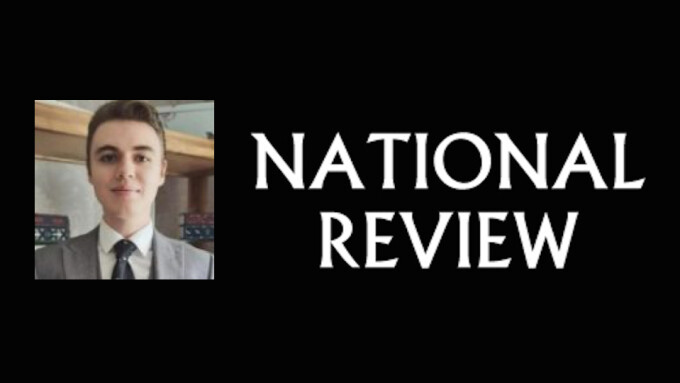WASHINGTON — Leading conservative magazine the National Review published an article on Friday spelling out the most likely pathways for anti-porn activists to “win the War on Porn.”
The article was written by Cameron Hilditch, the William F. Buckley Fellow in Political Journalism at National Review Institute.
Hilditch identified the campaign’s goal to "end Internet porn once and for all.”
Comparing the War on Porn to the British conquest of Ireland, Hilditch advised the anti-porn crusaders that “the kings of each petty tribe had to be fought and defeated one-by-one until total military conquest was achieved.”
This is consistent with NCOSE’s strategy of filing lawsuits, conducting witch hunts and paying for costly propaganda campaigns aimed at individual porn companies (MindGeek, WGCZ, OnlyFans), and also of targeting individual state legislatures for votes on dubious claims (“porn is a public health crisis,” mandatory porn filters) in order to win a “war of attrition” against the very idea of pornography.
“To put it plainly,” Hilditch wrote, “there is no centralized point of power over the Internet the regulation of which would spell doom for online pornography. As much as many social conservatives would like to have one big legislative Battle of Hastings that would end Internet porn once and for all, material conditions have already foreclosed this possibility.”
Porn Filters and the 'Red Light District' Solution
Hilditch does question the effectiveness of laws like Utah’s “porn filter” bill, signed into law by Governor Spencer Cox last month.
“A rather strange provision in the law prevents the measure from going into effect until at least five other states have enacted similar restrictions,” Hilditch pointed out. “This is a concession to the fact that it would be impossible for a single state to enforce a law like this on its own. But even the idea that five states together could do something like this is, unfortunately, little more than wishful thinking.”
The National Review think tank writer also expressed reservations about the “Red Light District” approach (ghettoizing adult content under .xxx or .sex domains) and the protracted, confusing Section 230 debates.
“Some porn restrictionists advocate an approach called ‘domain zoning,’ which would force all pornography websites to use the domain name '.xxx' instead of '.com' or any other commonly used domain,” Hilditch writes. “Clamping down on porn would then simply be a matter of prohibiting access to websites ending in ‘.xxx.’ This, too, however, is a more-or-less unenforceable measure. Website names are protean things that can be repeatedly changed and modified to elude regulators indefinitely. This is already what illegal movie-streaming sites habitually do.”
An 'Anti-Obscenity Trump' Fantasy
Although he readily admitted that reforming Section 230 is merely a ploy to “expose publishers of obscenity to legal action,” Hilditch bemoaned that “the regnant legal definition of obscenity in the United States, established in the 1973 Supreme Court case Miller v. California, is pitifully vague to the point of being practically useless in this respect.”
“Even if President Trump had tried to follow up on his campaign promise to enforce federal obscenity laws against pornographers, the legal semantics established by Miller would have left him with few options,” he clarified.
Hilditch also identified his audience as an alliance between “social conservatives and anti-porn feminists” against what he called “a libertine cultural landscape.”
According to Hilditch, the strategy to “to end Internet porn once and for all” must begin with developing technological tools to achieve a domination of speech similar to what’s currently occurring in China.
'A Rearguard Action' to 'Extirpate' Internet Porn
“Technological innovation and market forces can be used to check the spread of pornography in much the same way they’ve been used to proliferate it,” Hilditch wrote. “But for a rearguard action against pornography to be successful, it will have to begin at the grassroots level rather than be handed down from on high by legislators.”
Among his proposals is to deploy ad-blocking technology to censor adult content, providing the example of a company named Pi-hole.
Pi-hole, Hilditch writes, “has built a piece of open-source software that allows users to block their devices from accessing certain domain names by preventing those domain names from resolving to a useable IP address. At the moment, Pi-hole is used for things like blocking ads on websites, but the technology could easily be applied to pornography. It’s not hard to imagine a tech start-up that would market itself as an open-source anti-porn collective. Such an organization would keep an eye on the ever-growing list of porn sites and constantly update its program to block their IP addresses.”
Although he admitted “social conservatives who favor a legislative response to the proliferation of pornography will probably have little patience with this approach,” Hilditch deems it the only viable approach in the long term.
The Conservative 'Freedom vs. Censorship' Conundrum
“The only way to comprehensively ban pornography would be to have a complete and total government takeover of the Internet, as has been accomplished by the Chinese Communist Party,” he fantasized. “This would be somewhat analogous to the Norman strategy of total conquest in Ireland. It would also, for all practical purposes, mark the end of freedom and privacy in the United States of America. Few, one would hope, would regard this as a worthy price to pay for the extirpation of Internet pornography.”
The National Review article ends with a call for anti-porn forces to gather at the grassroots level.
“The War on Porn must be fought, and fought collectively” he concluded, and “voluntary association is not only the best method for doing so but the method most in keeping with the American character.”
Main Image: Anti-porn strategist Cameron Hilditch (Photo: The National Review)






